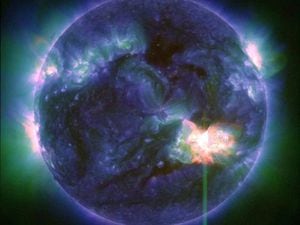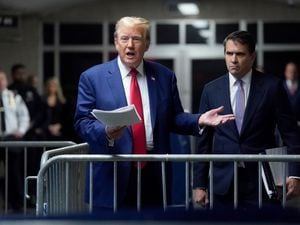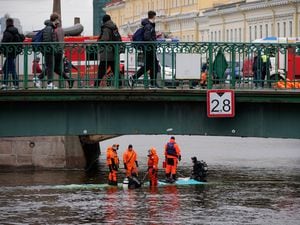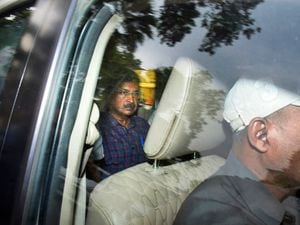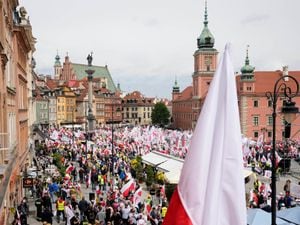Palestinian protester killings overshadow US embassy opening in Jerusalem
More than 500 demonstrators were wounded after the Israeli military opened fire during a march on the Israeli border.
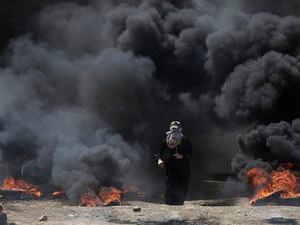
Israeli forces have killed at least 18 Palestinians during mass protests along the Gaza border, casting a cloud over the inauguration of the new US embassy in Jerusalem.
It is the deadliest single day of protests since the Palestinians began staging weekly border demonstrations on March 30 in an attempt to break an Israeli-Egyptian blockade.
Protesters set tyres on fire, sending thick plumes of black smoke into the air, while the Israeli military accused protesters of trying to break through the border fence and plant a bomb. They also claimed troops had come under fire.
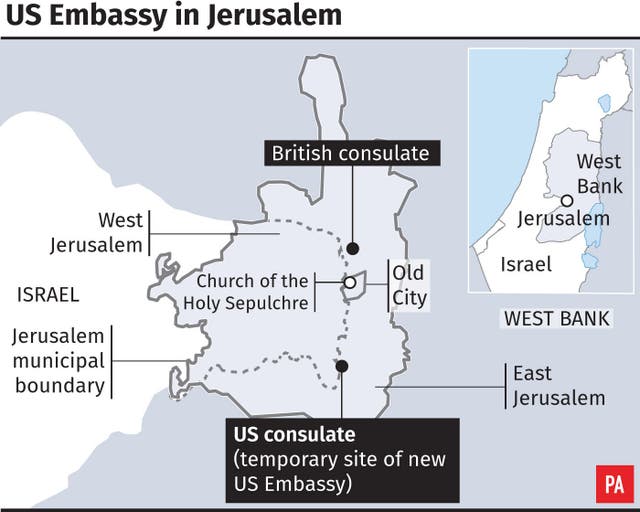
In the West Bank, several thousand people gathered in the centre of Ramallah, while hundreds marched to the Qalandiya crossing on the outskirts of Jerusalem, where protesters threw stones at Israeli troops.
The protest in Gaza is the biggest yet in a weeks-long campaign against a decade-old blockade of the territory. The march was also directed at the inauguration of the US embassy in Jerusalem later.
The relocation of the embassy from Tel Aviv, a key campaign promise of US president Donald Trump, has infuriated the Palestinians, who seek east Jerusalem as a future capital.

The showdown between Israel’s military and Gaza’s Hamas rulers along the volatile border is the culmination of a campaign, fuelled by despair among Gaza’s two million people, to break the decade-old border blockade of the territory imposed by Israel and Egypt after Hamas seized control of Gaza in 2007.
Since weekly border marches began in late March, 60 Palestinian protesters have been killed and more than 2,300 were wounded by Israeli army fire.
Hamas leaders have suggested a border breach is possible on Monday, while Israel has warned it would prevent protesters from breaking through the barrier at any cost.
Most of the casualties were in the southern Gaza towns of Khan Younis and Rafah. Israeli forces were firing volleys of tear gas to disperse the crowds, and the sound of heavy gunfire could be heard. Sirens were constantly wailing as the wounded were evacuated on stretchers to nearby ambulances. Groups of young activists repeatedly approached the fence, but were quickly scattered by gunfire and tear gas.

The US said it chose the date to coincide with the 70th anniversary of Israel’s establishment.
But it also marks the anniversary of what Palestinians call their “nakba”, or catastrophe, a reference to the uprooting of hundreds of thousands who fled or were expelled from what is now Israel during the 1948 war surrounding Israel’s independence.
A majority of Gaza’s two million people are descendants of refugees, and the protests have been billed as the “Great March of Return” to long-lost homes in what is now Israel.
Mr Trump’s decision to go forward with a campaign promise to move the American embassy from Tel Aviv to Jerusalem was welcomed by Israel and condemned by the Palestinians.
Israel captured east Jerusalem in the 1967 Middle East war and annexed it in a move not recognised by the international community. The Palestinians seek the city’s eastern half as the capital of a future state.

Israeli prime minister Benjamin Netanyahu praised Mr Trump’s “bold decision” in upending decades of US policy by recognising Jerusalem as Israel’s capital. “It’s the right thing to do,” a smiling Mr Netanyahu told a jubilant crowd at a reception in Jerusalem late on Sunday.
Although Mr Trump has said his declaration does not set the final borders of the city, his recognition of Jerusalem as Israel’s capital has been perceived by both Israel and the Palestinians as taking Israel’s side in the most sensitive issue in their conflict.
Russia’s deputy foreign minister Mikhail Bogdanov described the relocation as “short-sighted”, and blamed the “escalation around Gaza” on the US. Meanwhile, the Cairo-based Arab League called on the international community to oppose what it considers an “unjust decision” and the ongoing “Israeli occupation” of the city.
It called the relocation a “blatant attack on the feelings of Arabs and Muslims” and a “grave violation of the rules of international law” that would destabilise the region.
Monday’s opening will be attended by Mr Trump’s daughter Ivanka and son-in-law Jared Kushner, who both serve as White House advisers. Mr Kushner leads the Trump Middle East team.

